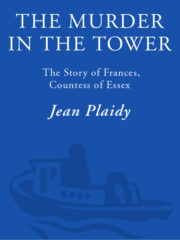James faced the young man and saw murder in his face. His first emotion was anger at his stupidity rather than fear for his life. He had known he was trapped, and that the Gowries had brought him here to murder him.
And they would have murdered him, but for great good fortune. He had been a friend to Ramsay, and Ramsay was ready to risk his life in his service. There had not been many like him; so what good luck that Ramsay had been with him that day! The boy, being anxious because of his disappearance, had prowled about the house searching for him and, hearing his master’s cries, found a way of forcing the turnstile and making his way to the circular chamber by means of a private door. He had arrived just in time, for Ruthven had the advantage, and there would certainly have been murder that day at Gowrie House but for Ramsay.
Several of Ruthven’s servants, who had been warned to keep all away from the chamber, came hurrying through the private door after Ramsay, and joined in the fight. For some minutes James and his servant held off Ruthven and his; and, seeing how evenly matched they were, one of Ruthven’s servants declined to help his master, declaring that he wanted no part in killing the King.
Marr and Lennox, who had been with the hunt that day, missing the King, came on to Gowrie House and, hearing them galloping up, James managed to reach a window and shout down: “Treason! I am murtherit!”
Lennox found a ladder and climbed it; but it was not until the Earl of Gowrie and Alexander Ruthven had been killed that the King was rescued.
“And that, Robbie,” James ended, “was the Gowrie Plot, and it happened in Scotland; and then when I came to England my enemies took a turn with the gunpowder.”
He could see that Robert’s attention was forced. Poor laddie, he would have to learn to concentrate.
“Concentration, mannie, is the secret of acquiring knowledge; did ye know? Train the mind not to wander, however dull the road, however pleasant the meadows by the wayside may seem. ’Twas a lesson I learned early in life. I shall have to give you lessons in the art.”
“Your Majesty has given me so much.”
“And now your mind is on brocade and velvet, eh? And your old gossip tires you with his talk of bloody murder. Give me your arm, lad. We’ll away and choose the velvet for your jacket and breeks. And we’ll see that there’s no delay in making them.” He rose to his feet and for a moment swayed uncertainly, till he leaned heavily on Robert. “But dinna fret yourself for the Queen. She won’t love you, boy, but she’ll no harm you. The Queen’s a good woman, though between ourselves, boy, I’ve often thought her a frivolous one. Now … velvet and brocade … satins and silks. We’re going to make Robbie Carr a proper man of the Court.”
Prince Henry rode out of the Palace of Whitehall and turned eastward. He was soberly dressed and took with him only one attendant, for he was eager not to be recognized. His visits to the Tower were becoming more and more frequent and he did not want them to be commented on lest his father should forbid them. Had James done so, Henry would still have found some means of visiting his friend; he could be stubborn when he believed himself to be in the right, but he was not one to court trouble.


"The Murder in the Tower: The Story of Frances, Countess of Essex" отзывы
Отзывы читателей о книге "The Murder in the Tower: The Story of Frances, Countess of Essex". Читайте комментарии и мнения людей о произведении.
Понравилась книга? Поделитесь впечатлениями - оставьте Ваш отзыв и расскажите о книге "The Murder in the Tower: The Story of Frances, Countess of Essex" друзьям в соцсетях.